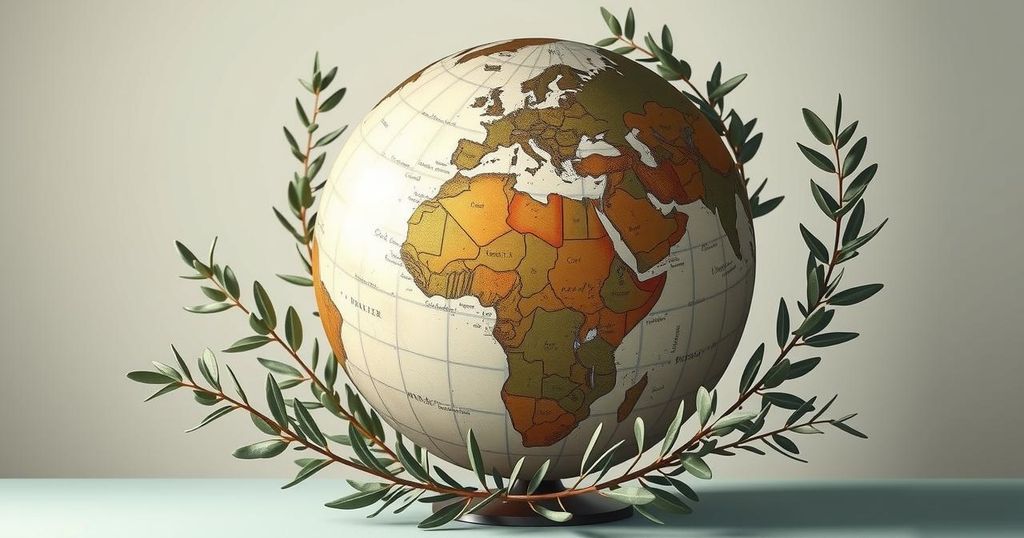Israeli Prime Minister Benjamin Netanyahu will meet with U.S. President Donald Trump to discuss the ongoing war in Gaza, the hostage situation, and countering Iranian aggression. Despite a temporary truce facilitating hostage exchanges, challenges remain, and both leaders face pressure regarding military operations and diplomatic relations in the Middle East.
Israeli Prime Minister Benjamin Netanyahu is set to meet with U.S. President Donald Trump this week to discuss Israel’s claimed victory over Hamas, strategies to counter Iranian influence, and the enhancement of diplomatic relations with Arab nations. This meeting, taking place at the White House, marks Trump’s first engagement with a foreign leader since his second inauguration. Trump has supported Netanyahu in efforts to broker a ceasefire amid ongoing hostilities.
The current truce has seen 18 hostages released in exchange for hundreds of Palestinian prisoners; however, future negotiations will be challenging. Hamas has regained control over Gaza, defying Israel’s wishes to restrict their power during the ceasefire. The militant group refuses to free additional hostages unless the conflict concludes and Israeli forces withdraw from Gaza.
Under pressure from his far-right allies, Netanyahu is facing mounting calls to resume military operations against Hamas as the initial truce phase approaches its end. Trump’s position remains ambiguous; he has historically endorsed Israel while advocating for an end to prolonged conflicts in the Middle East.
Netanyahu reiterated Israel’s commitment to achieving total victory over Hamas and recovering all hostages, following an attack by the group on October 7, 2023, which resulted in 1,200 casualties and numerous hostages. Despite the ceasefire, violence continues with an Israeli airstrike reported in Gaza, leading to additional casualties.
Netanyahu remarked ahead of his trip that the discussions with Trump will focus on “victory over Hamas, achieving the release of all our hostages and dealing with the Iranian terror axis in all its components.” This encompasses Iran’s involvement with militant factions in the region. Their cooperation aims to enhance mutual security and expand peace in the area.
Currently, Hamas is obligated under the ceasefire to release a total of 33 hostages, and Israel has allowed substantial return of displaced Palestinians to northern Gaza. Negotiations for the second phase of the ceasefire, which includes ending the war and securing the release of remaining hostages, are set to commence soon, with implications for the conflict’s future.
President Trump previously facilitated normalization agreements between Israel and several Arab nations during his presidency. Presently, Saudi Arabia has indicated that any further agreements will hinge on a cessation of hostilities in Gaza and a credible plan for Palestinian statehood, a topic that remains contentious in Israeli politics.
Despite a temporary ceasefire in Gaza, Israeli military activity has intensified in the West Bank, resulting in a significant rise in violence. Reports indicate that several Palestinians have been killed as Israeli forces continue operations against suspected militants. The backdrop of the ongoing conflict remains tense, exacerbated by daily military raids and violence between settlers and Palestinians.
The recent conflict between Israel and Hamas has led to a complex situation involving hostages and escalating violence. The recent six-week ceasefire effort, brokered with U.S. support, has allowed some hostages to be released while negotiation for a more comprehensive peace continues. Netanyahu’s upcoming meeting with Trump signifies ongoing international involvement in the conflict, particularly concerning Iranian influence and diplomatic relations in the Middle East.
The meeting between Netanyahu and Trump is critical for addressing the ongoing war’s progression, the hostage crisis, and relations with Iran and Arab states. While a ceasefire has temporarily halted major conflict, underlying tensions remain, particularly regarding Hamas’s control in Gaza and violence in the West Bank. The outcomes of these discussions could substantially affect future diplomatic and military strategies in the region.
Original Source: www.voanews.com




